 Petzlover
Petzlover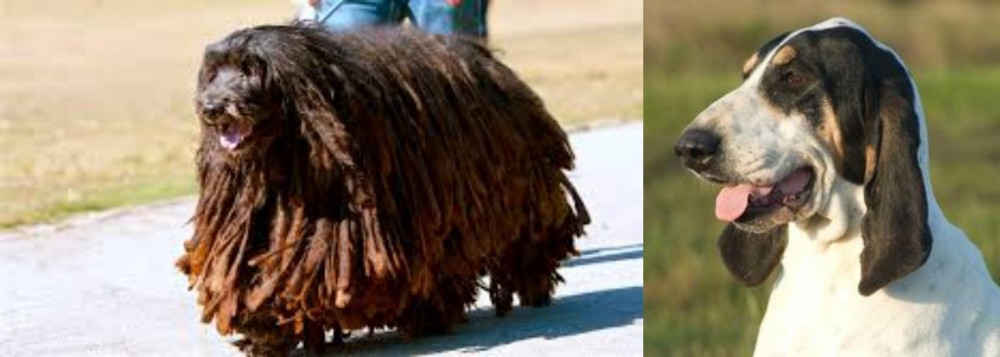 Bergamasco is originated from Italy but Grand Gascon Saintongeois is originated from France. Bergamasco may grow 11 cm / 4 inches shorter than Grand Gascon Saintongeois. Both Bergamasco and Grand Gascon Saintongeois are having almost same weight. Both Bergamasco and Grand Gascon Saintongeois has almost same life span. Bergamasco may have more litter size than Grand Gascon Saintongeois. Bergamasco requires Moderate Maintenance. But Grand Gascon Saintongeois requires Low Maintenance
Bergamasco is originated from Italy but Grand Gascon Saintongeois is originated from France. Bergamasco may grow 11 cm / 4 inches shorter than Grand Gascon Saintongeois. Both Bergamasco and Grand Gascon Saintongeois are having almost same weight. Both Bergamasco and Grand Gascon Saintongeois has almost same life span. Bergamasco may have more litter size than Grand Gascon Saintongeois. Bergamasco requires Moderate Maintenance. But Grand Gascon Saintongeois requires Low Maintenance
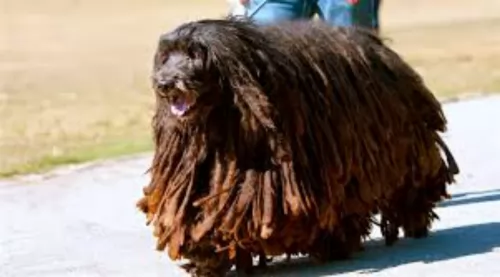 The Bergamasco comes from northern Italy. This medium sized sheepdog is of ancient origin. Known as an Italian sheep herding breed, his name actually comes from the town where he comes from - Bergamo.
The Bergamasco comes from northern Italy. This medium sized sheepdog is of ancient origin. Known as an Italian sheep herding breed, his name actually comes from the town where he comes from - Bergamo.
It was after World War II that there was danger that this breed would disappear as the need for herding and shepherding was diminishing. An Italian breeder, however, Dr. Maria Andreoli, stepped in to save the breed.
It was in 2015 that the American Kennel Club also changed the breed’s status from Miscellaneous to the Herding Group.
 Known also as the Virelade, the Grand Gascon Saintongeois hails from the Saintongeois region of France, being a newish addition to the hunting dog breed.
Known also as the Virelade, the Grand Gascon Saintongeois hails from the Saintongeois region of France, being a newish addition to the hunting dog breed.
The Saintongeois hound and the Grand Blue de Gascogne are the ancestors of this scentdog as these two breeds themselves, are exceptional hunters. The Grand Gascon Saintongeois is a large dog and favored by the French nobility for its ability to hunt.
After the French Revolution the popularity of the breed waned. It was Baron Joseph de Carayon-LaTour who tried to revive the Saintongeois Hound. The dogs were mated with the Grand Bleu de Gascogne and were so outstanding that breeding was continued. The breed that was created is the Grand Gascon Saintongeois which we know today.
It was in January 1993 that the Grand Gascon Saintongeois was officially recognized by the United Kennel Club.
 This medium sized sheepdog stands 54 – 62cm in height and weighs up to 38 kg as an adult. It is his coat which draws the most attention. It is of a coarse texture and actually greasy to the touch. It actually forms into strands or almost like dreadlocks from the top of the body, so that people agree he is one of shaggiest dog breeds there are.
This medium sized sheepdog stands 54 – 62cm in height and weighs up to 38 kg as an adult. It is his coat which draws the most attention. It is of a coarse texture and actually greasy to the touch. It actually forms into strands or almost like dreadlocks from the top of the body, so that people agree he is one of shaggiest dog breeds there are.
From age 1 on the coat starts to become woolly, and then the flocks start to form. As these clumps of hair appear, it will become necessary to separate them into smaller cords by hand to ensure attractive formation Brushing isn’t necessary but a big toothed comb can keep their hair ‘groomed’.
The colour of the coat is solid grey with patches of shades of grey and sometimes black. His dense, heavy coat makes it that he is suited to cooler climates. Because he is a herding dog, he wouldn’t do well in an apartment but would suit a home with a large garden.
He is intelligent and social but will need firm handling as he is a boisterous dog. He has a muscular yet compact body with a large head, long tail, high-set semi-drooping ears and large, gentle looking brown eyes. Although not instinctively aggressive, he makes an excellent watch dog with strong protective instincts to protect his human family.
He views new people into his circle with suspicion and wariness. He is good with kids and pets in the home and is playful and energetic.
 The Grand Gascon Saintongeois is a large, well built breed of dog that looks strong and robust. His head is strong and covered with loose skin that forms wrinkles around the cheeks. He stands at 61-73cm and weighs 30 to 35kg.
The Grand Gascon Saintongeois is a large, well built breed of dog that looks strong and robust. His head is strong and covered with loose skin that forms wrinkles around the cheeks. He stands at 61-73cm and weighs 30 to 35kg.
He has straight, long legs. He has a short, smooth coat which is white with black patches. Sometimes you'll also find a speckled or ticked pattern. There'll be tan dots over the eyes.
The eyes are brown, the nose black and the long, thin textured ears are low on the dogs head and also well back on the skull. The tail is long.
He is known for his deep voice to voice an opinion. He is a loving, friendly, courageous and affectionate breed with a well balanced temperament, making him a splendid pet. He is also intelligent and so he won't battle at all to learn some rules. Training and socialization will be good for him even though he is such an amicable dog already, but then he just becomes extra obedient.
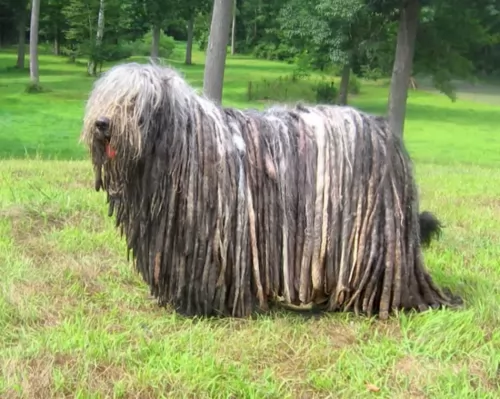 This is a working dog so they are naturally alert. He is also intelligent and independent and this independence is seen with training as he doesn’t take easily to following instructions, becoming stubborn. You’ll certainly want to have your Bergamasco socialized and trained as he can be a boisterous dog, bounding with energy.
This is a working dog so they are naturally alert. He is also intelligent and independent and this independence is seen with training as he doesn’t take easily to following instructions, becoming stubborn. You’ll certainly want to have your Bergamasco socialized and trained as he can be a boisterous dog, bounding with energy.
This is a dog that will need to be kept busy and provided with plenty of activities so that he remains happy, playful and relaxed.
Lively and intelligent, these dogs also form strong bonds with their owners and get on well with the children in the home. He will take well to country life as opposed to living in the city.
 Your Grand Gascon Saintongeois is a true hunting dog breed and valued for his hunting prowess. He has another side to him though and is gentle, loving and calm with his human family.
Your Grand Gascon Saintongeois is a true hunting dog breed and valued for his hunting prowess. He has another side to him though and is gentle, loving and calm with his human family.
He makes a wonderful family companion, getting on well with children as well as pets in the home. He may show a bit of aggression to strangers and this is why training and socialization works so well with him as it helps him behave well around family and strangers.
Training is never a problem as he is an intelligent dog. He is an energetic dog and won't fit well into city life in tiny properties, also because of his tendency to bark when bored. He fits well into country life or large properties.
When you provide your large pet with good food, a warm place to sleep, exercise and plenty of love and attention, the Grand Gascon Saintongeois is going to turn out to be one of the most loyal, affectionate pets you can imagine.
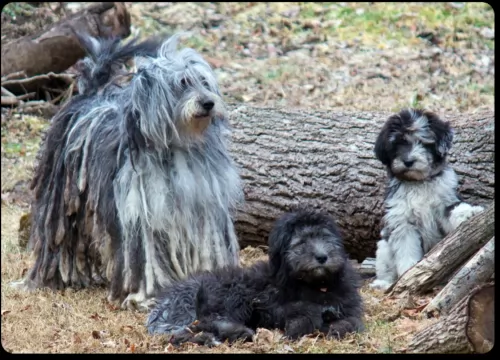 Your Bergamasco can live to be 13 to 15 years of age and he is considered to be a healthy breed. Nonetheless you want to be aware of health issues that are common to this breed
Your Bergamasco can live to be 13 to 15 years of age and he is considered to be a healthy breed. Nonetheless you want to be aware of health issues that are common to this breed
he is vulnerable to heat. He can die of heat exhaustion quicker than other breeds
keep an eye on him for hip dysplasia, progressive retinal atrophy and skin allergies
 Your Grand Gascon Saintongeois is a robust dog, who with good care can reach up to 14 years of age. You're not going to be running to the vet often with this strong looking dog, but even so, there are one to two problems that you'll want to look out for.
Your Grand Gascon Saintongeois is a robust dog, who with good care can reach up to 14 years of age. You're not going to be running to the vet often with this strong looking dog, but even so, there are one to two problems that you'll want to look out for.
Long-eared dogs are more susceptible to canine ear infections. The symptoms of the infection will be dependent on how severe it is. Certainly your dog may experience pain and you'll see him shaking his head and pawing at his ear. If both ears are affected by inflammation, he may even walk in a wobbly fashion and the infection could lead to deafness. It is imperative that he get to the vet as soon as possible.
This is where the ball and socket joint of the hip is malformed. It results in a joint rubbing and grinding. It can lead to loss of function of the hip joints. It is a common skeletal disease in young or old dogs, small or large dogs and in both males and females.
Large dogs are more commonly affected though with hip dysplasia which can see arthritis developing too. Your dog will display decreased activity and difficulty with standing up after lying down. Veterinary intervention will be required.
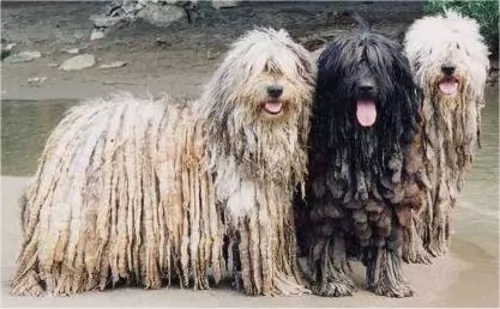 The Bergamasco isn’t a shedder but his coat will need to be combed once a week just to keep it in order. You don’t want to bath him too often, especially during the Winter as his coat takes a long time to dry. It isn’t recommended to shave a Bergamasco as the coat regulates the dogs temperature – keeping him warm and cold as the weather demands.
The Bergamasco isn’t a shedder but his coat will need to be combed once a week just to keep it in order. You don’t want to bath him too often, especially during the Winter as his coat takes a long time to dry. It isn’t recommended to shave a Bergamasco as the coat regulates the dogs temperature – keeping him warm and cold as the weather demands.
They thrive on a blend of kibble (dry) mixed with raw and-or moist food once or twice a day. Remember to include quality chicken, turkey, etc. mixed with some vegetables and rice into your dog’s diet. Ensure a constant supply of fresh water in an easily-cleanable bowl.
Balls and ropes are important for building muscle strength and burning energy. Remember your Bergamasco is a working breed and will need plenty of games and exercise.
 These large dogs with their short smooth coats have very little grooming needs. Regular brushing twice a week will remove dead hair and also ensure the good condition of the coat.
These large dogs with their short smooth coats have very little grooming needs. Regular brushing twice a week will remove dead hair and also ensure the good condition of the coat.
He has long ears and these will need to be checked regularly to avoid ear infections. It will be a good idea to learn how to clean the ears and to do it in such a way as to avoid damaging them. Signs of ear infection include redness, discharge, irritation and bad odor.
Following the feeding instructions on the packaging of top quality kibble, provide your Grand Gascon Saintongeois with at least 2 meals a day. To steer away from the monotony of kibble every day, mix in some raw meat from time to time, and also include some cooked brown rice, chicken and vegetables as a tasty treat. Fresh, cool water should always be easily accessible to him.